Dental Implants – Lincoln, NE
The Premier Solution for Missing Teeth
A full smile is essential for self-confidence as well as overall health and well-being. If you need to replace a single tooth or multiple missing teeth, then our Lincoln dental office has a terrific solution for you. Dental implants in Lincoln, NE can help you restore what you've lost and provide results that both look and feel natural. They offer the next best thing to real teeth, and at Pioneer Greens Dentistry, you’ll be treated by a team with decades of experience rebuilding smiles. If you want to learn more about the premier solution for missing teeth or are ready to schedule your consultation, do not hesitate to give us a call today!
Why Choose Pioneer Greens Dentistry for Dental Implants?
- Experienced Dental Team with Years of Specialized Training
- Start-to-Finish Dental Implant Treatment
- State-of-the-Art Technology for Precise, Lasting Results
What are Dental Implants?

A dental implant is actually a prosthetic tooth root. When a tooth goes missing, it’s not just the visible portion that goes away, but the supportive root structure below the gum line as well. An implant brings this part of the tooth back by placing a small titanium post into the jawbone, and then it’s attached to a crown, bridge, or denture to fully restore the teeth. Once in place, implant roots actually bond to the surrounding jawbone just like natural ones, giving implanted teeth a strength far surpassing traditional bridges and dentures.
While traditional bridges and dentures are excellent options for filling in the gaps in the smile, our dentists agree that dental implants are by far the most complete tooth replacement solution available today. They are the only treatment that restores both portions of a tooth above and below the gumline, halting bone loss, and they can also be trusted to last for 30 years or more. In the end, they provide the most reliable, durable, and natural-looking results of any treatment.
4-Step Dental Implant Process

Compared to many other dental procedures, implant dentistry is one of the most complex, but do not let that scare you! The good news is that here at Pioneer Greens Dentistry, we can walk you through every step from the first consultation all the way through restoration. We have decades of experience and can explain how dental implants work in our Lincoln office. The entire procedure will involve several steps that are completed over the course of multiple months.
Initial Dental Implant Consultation

Before we can get started with implant treatment, we need to have a dedicated consultation with you. Even though we won’t perform any actual dental work, this appointment is critical for success. During this visit, we will examine your mouth and take 3D images of your oral cavity to make sure you are healthy enough for the placement procedure. If there are any impediments to your getting implants, such as gum disease or insufficient bone density, we can take care of them as quickly as possible.
Dental Implant Surgery

Once we’ve determined that you are a good candidate, we will perform the placement surgery. This involves making a small incision in the gum tissue and putting the implant into position in the jawbone. Then, we will close the gums back up and put a temporary crown on the site to protect it as it heals. Fortunately, our team has the training and clinical experience to do the procedure in our office so that you do not have to travel to a specialist. You can work with a team you already know and trust!
Dental Implant Osseointegration & Abutment

Immediately recovering from this procedure usually only requires a couple of days, but the real process will be happening below the gum surface. The implant post stimulates new jawbone growth, which eventually surrounds the implant and keeps it stabilized. This process is called osseointegration, and it determines whether our implants are successful or not. We will let three to six months pass, ample time for osseointegration to occur. At that point, we can insert the abutment or connection piece.
Delivery of Dental Restoration(s)

After the abutment has been put into position and the gums have sufficiently healed around it, we can then work on getting your custom restoration made. We will take impressions of your mouth and send them to a dental lab. Then, they will fabricate the restoration to look exactly like real teeth. When finished, they’ll send us the final product, and we can bond it to your implant. Your complete smile will be ready for action!
Benefits of Dental Implants

From traditional bridges and dentures to state-of-the-art dental implants, there are plenty of available options to close annoying gaps and renew someone’s confidence. Which replacement choice do we believe is best? That really depends on the needs of a patient, but in most cases, our first recommendation is dental implants. Why? Because there are many benefits to dental implants in Lincoln, NE that other treatments simply can’t match, such as a 98 percent success rate years later.
Day-to-Day Benefits

With dental implants, the entire tooth from root to crown is recovered. This gives you stability and durability much more similar to real teeth, allowing you to eat whatever you like and not have to worry about annoying slippage. This also gives you much more confidence to eat, talk, and smile in front of others!
Unlike dentures, which entail extra steps for maintenance like overnight soaking, dental implants require the same basic care as natural teeth: daily brushing and flossing, along with regular visits to our Lincoln office.
Health Benefits

Once a tooth goes missing, the jawbone that used to support it will usually start to slowly shrink over time. This can cause the nearby teeth to shift into the open gap as well as give the face a “sunken,” aged appearance. However, when dental implants are placed into the bone, they revitalize it, encouraging fresh blood flow and new tissue growth. This helps the remaining teeth stay in place and gives a patient a more youthful facial shape at the same time. Implants are the only treatment able to accomplish this.
When you replace your missing teeth with implants, your new teeth will be strong enough to handle even tough, fibrous foods like broccoli, enabling you to enjoy a more nutritious, well-balanced diet. This leads to better overall health and a higher quality of life.
Long-Term Benefits

With just standard brushing, flossing, and routine dental visits, dental implants can easily last for decades on end, and in many cases, for the rest of a patient’s life. In addition, while dental implants do tend to cost more upfront compared to traditional bridges and dentures, they require much less maintenance and last many times longer as well. After adding up all the replacement costs of the other treatments, most implant patients end up spending thousands less on their new teeth over time.
In addition, as a result of being able to lead a healthier lifestyle, you may be more likely to enjoy better health later on in life.
Who Dental Implants Can Help

If you have suffered any amount of tooth loss, you need to consider dental implants as a replacement option. In fact, it is one of our most highly recommended treatments for patients who have missing teeth. Dental implants are versatile enough to be used by patients who need to replace just a single tooth, multiple teeth, or even a full row of teeth. When you meet with us in a consultation, we can create a personalized treatment plan to help you choose which restorative option would work best for you.
Who is a Good Candidate for Dental Implants?
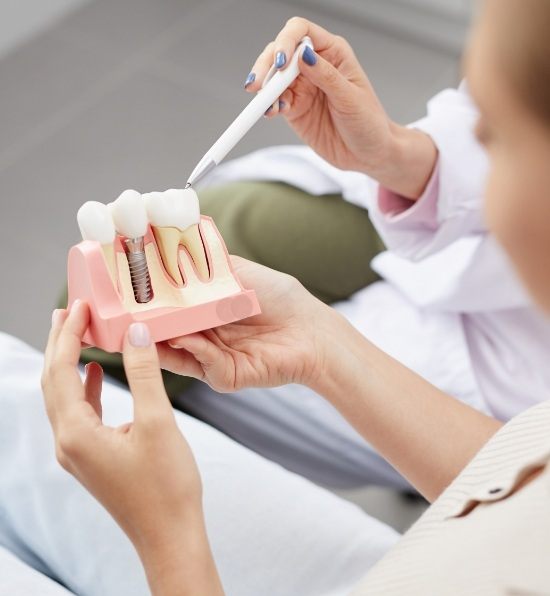
In order to get dental implants, a patient needs three basic things: good dental health (i.e., no infection or decay), stable overall health to undergo this minor surgical procedure, and a strong, thick jawbone to surround and support the implants. If a patient is lacking any of these requirements, this will need to be addressed before we can safely move forward with the implant procedure. Of course, we will be able to help you through this process if needed.
Missing 1 Tooth
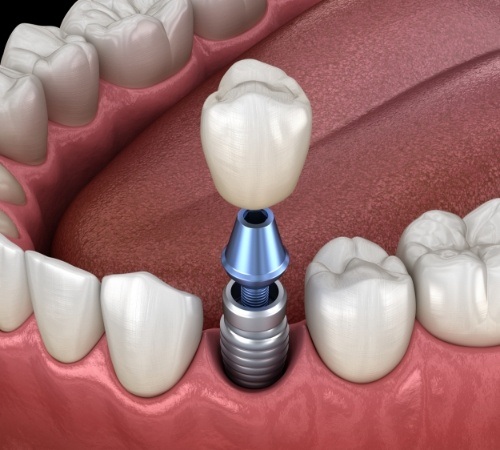
To fill in a lone gap in the smile, a bridge may substitute for the crown, but a single implant post also replaces the missing root. It can be topped with a custom-made crown that matches the natural teeth around it and directly attaches to the implant using a connector called an abutment. Also, unlike a traditional bridge, this new tooth will not require support from the adjacent teeth to stay in place, making it a seamless addition to your smile.
Missing Multiple Teeth
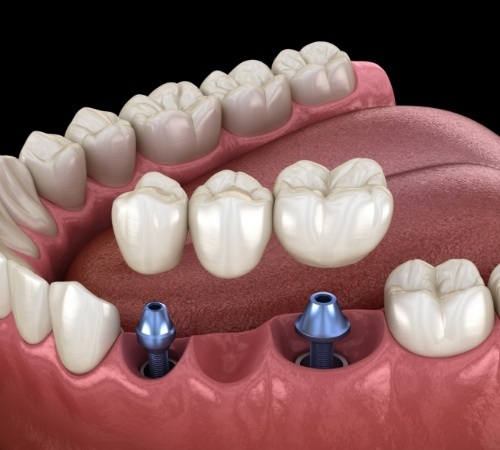
If you have two or more missing teeth, you may not need an implant for each lost tooth. Instead of replacing consecutive missing teeth with individual implants, two implants can be positioned on either side of the gap and be used to support additional prosthetic teeth, forming a strong and reliable bridge. Or, for gaps that are more spread out, you can attach your partial denture to a couple of implants for additional stability and support.
Missing All Teeth

Even if you have no natural teeth left in your mouth, a strong smile is still within your reach with dental implants. We can design a full denture that bonds to the top of anywhere from four to eight implants, anchoring it directly to the jawbone, which gives it a stability and fit that a traditional removable prosthetic simply can’t match. In fact, implant dentures offer the closest solution to nature and feel realistic, restoring up to 70 percent of your original biting force.
All-on-4 dentures are a great option for those who have experienced jawbone erosion, as this treatment involves anchoring four implants to the most supportive areas of the bone structure to minimize the need for preliminary treatments like bone grafts. This allows you to enjoy all of the benefits of dental implants without the extensiveness of traditional treatment.
Learn More About Implant Dentures
Maintaining & Caring for Your Dental Implants

One of the amazing features of dental implants is that they can last for decades. In fact, when they are properly cared for, they can still be in excellent shape 30 years after placement! Although your replacement teeth cannot become decayed, gum disease or other oral problems can still put your smile at risk. The key is to maintain it through simple, yet effective methods—the same methods we recommend for taking care of natural teeth.
Make Oral Hygiene a Priority

First, taking care of your implants requires daily cleaning. Brushing and flossing take just a few minutes out of your schedule, but they go a long way to prevent plaque buildup that can eventually lead to a gum infection. That is why it is essential to brush for a full two minutes twice per day and floss at least once per day.
Eat a Healthy Diet

The choices you make in your daily diet impact the health of your mouth. As a result, when you eat sugary, starchy foods like cookies, candy, bread, crackers, and much more, you actually also feed the bad bacteria that create plaque. By limiting your consumption of these kinds of foods, you reduce the amount of plaque in your mouth and therefore reduce your risk of gum disease and other complications. Healthy foods, such as apples, carrots, and leafy greens can actually benefit both your body and your smile, which is why we recommend fueling yourself with these kinds of foods.
Break Bad Habits

Although your dental implants are certainly durable, they are not indestructible. If you had smile-damaging habits before implants, these could also lead to problems with your replacement teeth as well. For instance, smoking may not directly harm teeth or your implants, but it encourages bacterial growth that can weaken the jawbone and gum tissue, causing your implants to fail. Try to quit bad habits that could endanger your restored smile so you can keep enjoying it for years to come.
Protect Your Dental Implants
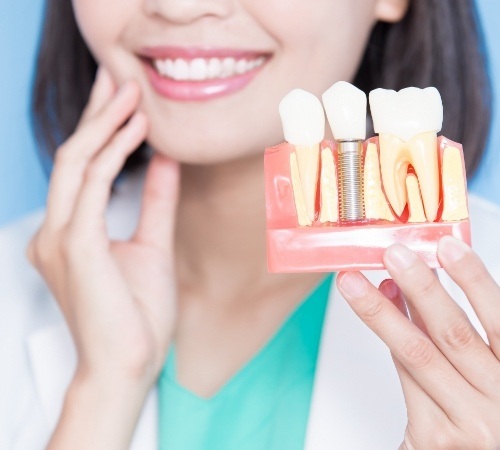
You may have negative habits you cannot necessarily control. Teeth clenching or grinding while you sleep can put excessive force on your implants, potentially leading to damage or failure. If you suffer from this, called bruxism, we can provide a custom nightguard that keeps your upper and lower arches from touching, thereby preserving your implants and your investment in your smile.
Schedule Regular Dental Checkups

Even if you have no natural teeth left in your mouth, you still need to come in for checkups on a regular basis. We will keep a close eye on your smile, catching any problems before they have a chance to cause implant failure. During these appointments, we can also take care of plaque you may have missed in your at-home care routine.
Understanding the Cost of Dental Implants
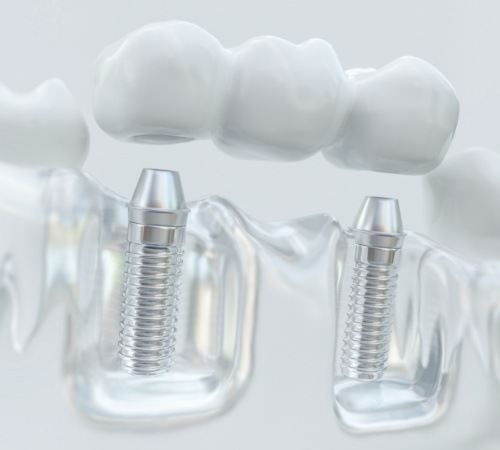
Because implants are quite versatile and designed to meet the needs of patients with varying degrees of tooth loss, the overall price of the procedure can vary quite a bit from person to person. So, with this in mind, what could make your implants more or less expensive? Read on below to learn more about the main factors that can affect the cost of dental implants in Lincoln, NE.
Factors That Affect the Cost of Dental Implant Treatment

- How many teeth need to be replaced? This one is pretty easy to understand--a single implant to replace one tooth will be less expensive than a bridge or denture needed to replace multiple teeth. Our dentists can work with you to determine how we can get the best results using the least number of implants.
- Where are the teeth located? Replacing a front tooth with an implant requires a bit more work compared to a back tooth, so they tend to be more expensive. Due to the visibility of the front teeth, esthetics is a big issue and needs to be considered carefully, and there is also less space/bone to work with, which can make the procedure much trickier as well.
- Do you need preparatory procedures? Issues like gum disease or a thin, weak jawbone can cause dental implants to fail, so they will need to be addressed before the implants can be safely placed. It may also be necessary to extract a few teeth to create room for a new denture. Fortunately, the team at Pioneer Greens Dentistry can take care of all these issues right in the dental office. For a general health problem (such as a heart issue or uncontrolled diabetes), we will refer a patient to their doctor.
- What is the dentist’s skill level? With any dental procedure, what you are mostly paying for is the skill and experience of the dentist themselves, and implants are no different. Dr. Shirk, Dr. Chris, and Dr. Claire have placed and restored implants for years and continually take additional training, so our patients always enjoy a smooth process and fantastic results. A dentist who charges less than most likely does not have as much experience with them, so when it comes to rebuilding your smile, paying a little more is definitely in your best interest. Nothing is more expensive than having to fix implants that were placed incorrectly!
Does Dental Insurance Cover Dental Implants?

Slowly but surely, more and more dental insurance plans are starting to offer benefits for implants, and many medical insurance plans can be used to help offset the cost of the placement surgery as well. Of course, every plan is different, so it’s best to read your policy to see what kind of implant benefits you have available. To make things easier for yourself, our Financial Coordinator, Brenda, can go over your plan with you and figure out the best way to maximize your benefits. Flexible, low-to-no interest financing is available as well.
Making Dental Implants Affordable

So how much will it cost for you to get dental implants in Lincoln? The only way we can give you a definitive answer is for you to come see us for an initial consultation. At this appointment, our team will examine your mouth, discuss your implant options, and then we can give you a hard number for the price. We can even help you go over your financial options during this visit to ensure that your treatment fits easily into your budget.
Whatever the cost may be, dental implants have consistently shown themselves to be a great investment that can last for decades, ensuring the health and appearance of our patients’ smiles. To learn more about the price of implants or schedule an initial consultation, contact us today.
Dental Implants Post-Op Instructions
Here at Pioneer Greens Dentistry, we will be with you every step of your implant journey from your first consultation all the way through restoration. One of the most challenging parts of the process for patients is the time after the implants have been positioned in the jawbone. It takes about four to six months for your mouth to fully recover and for the bone to grow around the implants. Before you leave our office, we will provide you with specific directions so that your recovery can go as smoothly as possible.
What to Do Directly After Dental Implant Surgery

Although not considered major surgery, implant placement is still a surgical procedure. As a result, your body will need time to rest and recover. We recommend having at least one day off work, maybe more. Keep clean gauze on the site and replace it when it becomes too saturated until the bleeding stops. Do not participate in rigorous activities for several days and allow a blood clot to form over the site. This protects the area from bacteria and allows the tissue underneath to heal properly.
Common Side-Effects

While you are recovering from the procedure, it is normal to experience some swelling and some discomfort in the face, which can be managed through over-the-counter pain medication and cold compresses. After about two days or so, these should start to subside. However, if you ever have a fever or the pain increases as the days pass, you need to call our Lincoln office right away.
Diet

Following implant placement, you will want to stay away from hard, crunchy foods. Oatmeal, eggs, mashed potatoes, yogurt, and applesauce are all examples of the kind of foods that are soft enough for your tender mouth. However, you should not have anything that requires the use of a straw! The sucking motion could remove the blood clot and cause a painful infection. After a few days, you may start to reintroduce normal foods into your diet.
Health & Oral Hygiene

Even while you are recovering from the placement procedure, it is important to keep up with your oral hygiene routine. Otherwise, you could have more teeth to replace in the future! While you brush and floss your teeth after implant placement, be extra careful around the site. Do not disturb the blood clot and resist the urge to spit out aggressively. If you have no natural teeth left in your mouth, gently rinse your mouth with warm water.
What to Do After Your New Teeth are Attached

Several months after the posts have been put into place, we can then position the abutments and restorations. After these procedures, your gums may be a little tender and need to get used to your new teeth. Otherwise, you are free to enjoy having a complete smile again! Just be sure to take proper care of your restoration through daily flossing and brushing to keep your mouth free from infection.
I Need a Checkup & Cleaning I Need a Dentist for My Child I am Worried About Gum Disease I Have a Cavity or Broken Tooth I am Missing One or More Teeth I Want to Enhance My Smile I Want a Straighter Smile I am Scared of the Dentist I'm Having Trouble Sleeping I Have a Dental Emergency View Our Services
